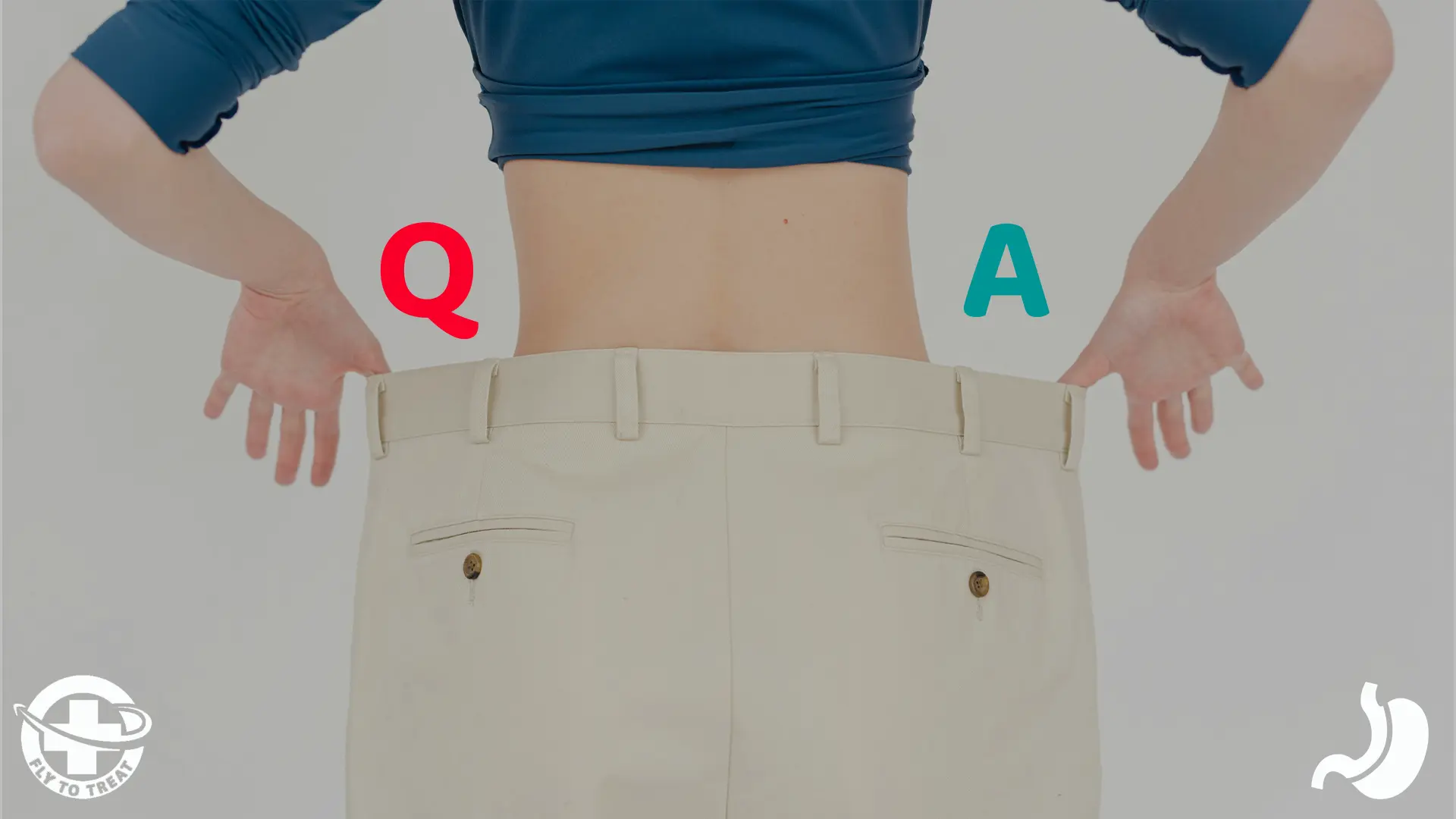
Gastric sleeve questions and answers
When considering weight loss surgery, understanding the details is essential. You're not alone if you're exploring gastric sleeve questions and answers. Many people have questions to ask before gastric sleeve surgery to ensure they are well-prepared. In this article, we'll address important topics like "How do I prepare for a sleeve gastrectomy?", "What is the gastric sleeve pre-op diet?" and "What are the side effects of gastric sleeve?". FlyToTreat answers these questions clearly, helping you feel confident and well-informed about your journey to better health.
What Questions to Ask About Gastric Sleeve Surgery?
Gastric sleeve surgery is a significant decision that requires careful consideration and thorough preparation. Understanding the procedure, recovery, and long-term effects is crucial for anyone considering this bariatric surgery. Knowing what questions to ask before and after gastric sleeve surgery is essential to ensure you're fully informed. This article provides:
• A comprehensive guide on the common questions about bariatric surgery.
• Addressing key concerns such as preparation.
• Recovery time.
• Lifestyle changes.
• Long-term outcomes.
We'll cover everything from questions to ask your bariatric surgeon to essential questions for your bariatric nutritionist. Whether you're curious about the gastric sleeve pre-op diet, exercise requirements, or potential side effects, this guide will help you navigate the gastric sleeve questions and answers you need to feel confident in your decision.
How Do I Prepare for a Sleeve Gastrectomy?
Preparing for a sleeve gastrectomy involves several crucial steps to avouching a successful surgery and recovery. Before the procedure, it's essential to clearly understand what questions to ask before gastric sleeve surgery to address any concerns.
Before getting a gastric sleeve, undergo a thorough medical evaluation and follow a preoperative diet to shrink your liver and reduce surgical risks. Make necessary lifestyle changes after gastric sleeve and consider seeking psychological support to prepare mentally for the surgery. These steps answer common questions about bariatric surgery and help address critical questions to ask your bariatric surgeon and nutritionist for optimal preparation and recovery. To explore more about preparing for a gastric sleeve, click the link.
What can't you do after gastric sleeve?
After gastric sleeve surgery, certain adjustments are necessary to ensure a smooth recovery and effective weight loss. You must eat small portions due to your reduced stomach size, requiring you to consume tiny meals and frequent daily snacks. Chewing thoroughly is crucial for digestion and to avoid discomfort. Some foods, such as sugary drinks, carbonated beverages, and tough or chewy items, should be avoided as they can cause blockages. You can see What foods are forbidden after gastric sleeve in the link. In terms of activity, it’s important to refrain from strenuous exercises and heavy lifting to allow for proper healing. Hydration is key, but drinking with meals should be avoided as it can dilute digestive juices. Instead, fluids should be consumed between meals.
These guidelines are designed to promote healing and successful weight loss. Your bariatric team will provide a personalized plan, detailing what is and isn’t allowed during your recovery.
Am I good candidate for gastric sleeve?
Determining whether you're a good candidate for gastric sleeve surgery depends on several factors. Typically, candidates have a BMI of 40 or higher or a BMI of 35 with obesity-related health conditions such as diabetes or hypertension. However, BMI is not the only criterion. Those who have struggled with weight loss through diet and exercise alone might also consider this surgery. Being mentally prepared for the lifestyle changes required after surgery is crucial, including dietary adjustments and regular exercise. Consulting with a healthcare professional can help you understand common questions about bariatric surgery and assess whether this procedure aligns with your health goals. Additionally, knowing what questions to ask before gastric sleeve surgery is essential in determining if you're an ideal candidate. These gastric sleeve questions to ask include your readiness for surgery and the long-term commitment to a healthier lifestyle.
Here you can explore Who is a Good Candidate for Gastric Sleeve Surgery with more depth
This assessment will help you make an informed decision about your eligibility for the surgery.
What happens ten years after gastric sleeve?
Ten years after gastric sleeve surgery, many patients experience the benefits of significant weight loss, improved health, and a better quality of life. However, some individuals may face challenges, such as weight regain, which can occur due to changes in lifestyle or the stomach stretching over time. This is why addressing gastric sleeve questions and answers with your healthcare provider is essential to maintain long-term success. Additionally, some patients may develop nutrient deficiencies, especially if they need to adhere to dietary guidelines or take recommended supplements. Understanding common questions about bariatric surgery and staying connected with your medical team can help you navigate these potential issues. Regular follow-ups and knowing what questions to ask after gastric sleeve surgery are crucial for sustaining your health and well-being a decade later. This foresight ensures you remain on track and enjoy the benefits of your procedure.
What is the gastric sleeve pre-op diet?
The gastric sleeve pre-op diet is crucial for preparing your body for surgery and improving your chances of a successful outcome. This diet is typically followed for two to three weeks before the procedure. It is designed to shrink the liver, making the surgery safer and more accessible. It mainly consists of a high-protein, low-carbohydrate plan, including protein shakes, lean meats, and non-starchy vegetables. As the surgery date approaches, the diet becomes more restrictive, eventually transitioning to clear liquids in the final days. This careful preparation helps reduce surgical risks and sets the foundation for healthier eating habits post-surgery. If you have gastric sleeve questions and answers in mind, consulting with your surgeon and nutritionist is vital to ensure you're following the proper steps. Always consider asking questions to a bariatric surgeon or a bariatric nutritionist to understand the common questions about bariatric surgery better and optimize your preparation for the procedure.
Feel free to check out The Essential Guide to Gastric Sleeve Diet Success for more information
Do I need to exercise after surgery?
Exercise is crucial for recovery and long-term health after gastric sleeve surgery, but it’s important to start gradually. Begin with light activities, like walking, to improve circulation and prevent blood clots—walking is particularly beneficial in the early days. Only advance to more structured exercises, such as low-impact activities like swimming or cycling, when your surgeon approves. Strength training can be introduced once you’ve built up your stamina to help rebuild muscle mass lost during surgery.
For further investigation about How soon after gastric sleeve can I exercise, feel free to click the link.
What is the average gastric sleeve recovery time?
You may ask How long does it take to recover from gastric sleeve surgery? Recovery time after gastric sleeve surgery varies based on individual factors and your type of work. Most patients leave the hospital within 1 to 3 days. Initial recovery takes about 2 to 4 weeks, during which rest is crucial before resuming light activities. If you have a desk job, you can typically return to work within 2 to 4 weeks, but for physically demanding jobs, it may take 6 weeks or longer.
It’s important to discuss gastric sleeve questions and answers with your surgeon to understand your specific recovery timeline. Addressing common questions about bariatric surgery with your healthcare team helps set realistic expectations and ensures a smooth recovery process. Knowing what questions to ask before gastric sleeve surgery can also aid in your preparation and post-surgery success.
What are the side effects of gastric sleeve?
Gastric sleeve surgery, while effective for weight loss, can come with specific side effects that patients should be aware of. One of the most common side effects is nausea, which often occurs in the early weeks post-surgery as the body adjusts to the smaller stomach size. Acid reflux and heartburn are also frequently reported due to the changes in stomach structure. Nutritional deficiencies may develop over time, particularly in vitamins like B12, iron, and calcium, making supplementation essential. There's also a risk of developing gallstones due to rapid weight loss. Some patients might experience sagging skin as a result of significant weight reduction. It's also possible to face hair loss after gastric sleeve, which you can read in the link. Discussing gastric sleeve questions and answers with your healthcare provider, including potential side effects, is essential to understand what to expect. Engaging in a thorough discussion about common questions about bariatric surgery with your surgeon and nutritionist can also help prepare you for the journey ahead.
Can I drink alcohol after gastric sleeve?
While the occasional drink might seem harmless, alcohol consumption after gastric sleeve surgery requires caution. With a reduced stomach, alcohol enters your bloodstream more quickly, intensifying its effects and increasing the risk of intoxication even with small amounts. Alcohol can also hinder nutrient absorption, which is vital after surgery, and may irritate your digestive system, potentially triggering dumping syndrome—a condition causing nausea, vomiting, and discomfort.
It’s essential to discuss gastric sleeve questions and answers with your doctor or bariatric team, particularly regarding alcohol consumption. Knowing what questions to ask before gastric sleeve surgery and understanding the risks can help you make informed decisions and ensure a safe recovery. Your healthcare team can advise on when, or if, it’s safe to reintroduce alcohol post-surgery.
Have you had gastric sleeve and gaining weight?
Gastric sleeve surgery is a major step towards weight loss, but some individuals may experience weight regain afterwards. Putting on weight after gastric sleeve can sometimes happen. Dietary shifts are crucial—maintaining a healthy diet and portion control is essential for long-term success. Unhealthy snacking or reverting to old eating habits can lead to weight gain despite the reduced stomach size. Lifestyle adjustments are also key; while the surgery is a helpful tool, regular exercise is necessary to sustain weight loss.
If weight regain occurs, it doesn’t have to be a setback. Discussing gastric sleeve questions and answers with your bariatric team can help identify the cause and develop a plan to get back on track. Understanding common questions about bariatric surgery and seeking guidance on nutrition, exercise, and support groups can help you achieve your weight loss goals.
Conclusion
Understanding the gastric sleeve questions to ask is crucial as you embark on your weight loss journey. Whether you're curious about the pre-op diet, recovery time, or potential side effects, having the correct information is critical to making an informed decision. We answered a couple of questions here such as “What is the average gastric sleeve recovery time?”, “ FlyToTreat supports you with expert guidance and answers to your most pressing concerns. Remember, thorough preparation and understanding will help you confidently navigate this life-changing procedure.
MEDICALLY REVIEWED BY: Dr. Ali Bazazi
AUTHOR: FlytoTreat's team of Authors
21 August 2024 - Updated At: 01 September 2024
Related Articles
Comment




